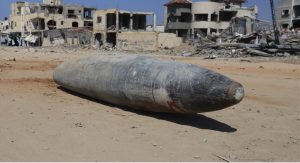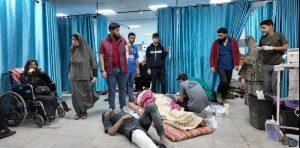
MERS
in a farm outside Riyadh, May 12, 2014. © AFP" width="300" height="170" /> A Saudi national is seen wearing a mask to avoid contracting MERS in a farm outside Riyadh, May 12, 2014. © AFPRiyadh, 16 Jumadil Awwal 1436/7 March 2015 (MINA)– The Middle East Respiratory Syndrome coronavirus (MERS-CoV) has killed 10 more people in Saudi Arabia over the past week, raising health officials’ concern about containment of the deadly virus.
Data from Saudi Arabia’s Health Ministry demonstrate that the death toll has surged above 400, with the latest deaths occurring between February 27 and March 5.
According to health officials, the virus killed 30 people in February alone, six of whom died in Riyadh, Press TV quoted by Mi’raj Islamic News Agency (MINA) as reporting.
A total of 936 cases have been reported since the virus was identified in 2012, with 402 of them leading to death.
Also Read: Tensions with Lebanon’s Hezbollah, Israel to Recruit 12,000 Additional Soldiers
On March 4, the Saudi Health Ministry announced an expansion of a public education campaign to halt the spread of MERS-CoV.
Social media, television, radio, print, and text messages are used to propagate the belief that “We can stop it.”
International investigation
The campaign was launched after an international team of the United Nations World Health Organization (WHO) and other agencies, including the United Nations Food and Agriculture Organization and the Paris-based World Organization for Animal Health, conducted a mission to investigate the surge in MERS cases.
Also Read: Hamas: Israeli President’s Africa Visit an Attempt to Undermine Support for Palestine
Officials from the international team said on February 23 that “efforts to educate professionals and the public are urgently needed.”
According to the WHO, the preliminary results of studies indicate that people working with camels are at increased risk of infection from MERS-CoV, and particularly juvenile camels are susceptible.
MERS, a respiratory disease which can cause severe pneumonia, was first discovered in September 2012 in a Qatari man who had traveled to the kingdom.
In early February, Abdul Aziz bin Saeed, the head of the center coordinating the Health Ministry’s response to MERS, warned that MERS cases suddenly increase around this time of year, when there are more young camels circulating.
Also Read: Indonesian Language Program Officially Opened at Al-Azhar University
In addition to Saudi Arabia, which is worst hit by the virus, MERS has been reported in more than 20 other countries. Most of the reported cases have been linked to the Middle East. However, some Persian Gulf states, France, Germany, Italy, Tunisia and Britain have been also affected by the virus.
The disease, which causes coughing, fever and pneumonia, does not appear to be as contagious as severe acute respiratory syndrome (SARS), which infected over 8,000 people and killed about 10 percent of them more than a decade ago. (T/P010/R03)
Mi’raj Islamic News Agency (MINA)
Also Read: Indonesia to Send Language Teachers to Al-Azhar University


















![French President Emmanuel Macron in Berlin, Germany on March 15, 2024 [Halil Sağırkaya – Anadolu Agency]](https://en.minanews.net/wp-content/uploads/2024/10/Screenshot_2024-10-22-20-57-45-59_40deb401b9ffe8e1df2f1cc5ba480b12-300x193.jpg)















 Mina Indonesia
Mina Indonesia Mina Arabic
Mina Arabic